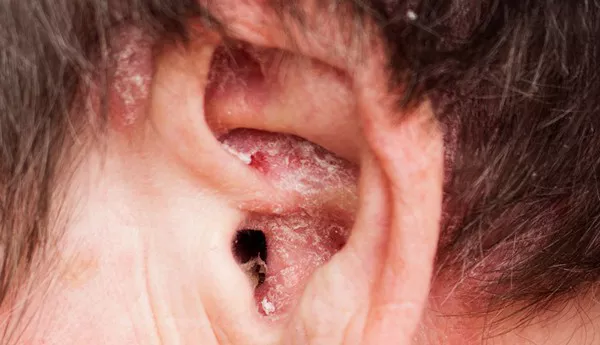Eczema, also known as atopic dermatitis, is a common skin condition that can affect various parts of the body, including the ears. This article will explore the causes of eczema in the ears, describe its symptoms, and provide insights into prevention and treatment options.
Definition and Explanation of Ear Eczema
Eczema, or atopic dermatitis, is a chronic inflammatory skin condition characterized by dry, itchy, and inflamed skin. While it most commonly affects areas like the hands, face, and neck, eczema can also manifest in the ears. Ear eczema can present with symptoms such as itchiness, redness, dryness, flaking, and even oozing in severe cases. The condition can affect the outer ear, the ear canal, or both.
There are several types of eczema that can impact the ears:
Atopic Dermatitis: This is the most common form of eczema and often occurs in people with a family history of allergies or asthma. It usually presents as itchy, inflamed skin that can become red and swollen.
Contact Dermatitis: This type of eczema occurs when the skin reacts to a specific substance, such as jewelry, hair products, or certain fabrics. In the ears, contact dermatitis can be triggered by earrings, headphones, or hair dye.
Seborrheic Dermatitis: This form of eczema typically affects areas with more oil-producing glands, such as the scalp and ears. It often presents as flaky, greasy patches of skin and can be associated with dandruff.
SEE ASLO: Can Contact Dermatitis Cause Blisters?
Common Causes of Ear Eczema
Understanding the causes of ear eczema is crucial for managing and preventing flare-ups. Below are some common factors that can contribute to the development of eczema in the ears.
Genetics
A significant factor in the development of eczema, including ear eczema, is genetics. If you have a family history of eczema, allergies, or asthma, you are more likely to develop the condition. Genetic predisposition can make the skin more sensitive and reactive to environmental triggers, leading to eczema flare-ups.
Environmental Triggers
Environmental factors play a vital role in exacerbating or triggering ear eczema. These can include:
Allergens: Common allergens like pollen, dust mites, pet dander, and mold can trigger eczema in the ears. When these allergens come into contact with the skin, they can cause an inflammatory response, leading to redness, itching, and discomfort.
Irritants: Everyday products such as soaps, shampoos, lotions, and certain fabrics can irritate the sensitive skin in and around the ears. These irritants can strip the skin of its natural oils, leading to dryness and making it more susceptible to eczema.
Climate: The weather can significantly affect eczema symptoms. Dry weather can lead to dehydration of the skin, causing it to crack and become more prone to eczema. Conversely, high humidity can cause sweating, which can also trigger flare-ups by irritating the skin.
Infections
Ear infections can exacerbate the symptoms of ear eczema. When the skin is already inflamed and sensitive due to eczema, an ear infection can worsen the condition, leading to increased redness, pain, and sometimes even discharge from the ear.
Other Factors
Several other factors can contribute to the development or worsening of ear eczema:
Stress: Emotional stress can weaken the immune system and make the skin more reactive, leading to eczema flare-ups.
Lack of Sleep: Poor sleep quality can impact the body’s ability to repair and regenerate skin, making it more susceptible to eczema.
Poor Hygiene: Inadequate ear hygiene can lead to the buildup of dirt, oil, and dead skin cells, which can clog pores and trigger eczema.
Preventing Ear Eczema
While it may not be possible to completely prevent ear eczema, there are several steps you can take to minimize your risk of flare-ups:
Minimize Exposure to Triggers: Identify and avoid known triggers, such as certain allergens, irritants, and harsh weather conditions. Wearing hypoallergenic earrings and avoiding hair products that contain harsh chemicals can also help.
Use Hypoallergenic Products: Opt for skincare products that are free of fragrances, dyes, and other potential irritants. Gentle, non-soap cleansers and moisturizers formulated for sensitive skin are ideal.
Keep the Ears Clean and Dry: Regularly clean the outer ear with a soft cloth and avoid inserting anything into the ear canal. After washing or swimming, make sure to thoroughly dry the ears to prevent moisture buildup, which can lead to irritation.
When to Seek Professional Help
It is essential to know when to seek medical attention for ear eczema. If you experience severe pain, bleeding, pus, or a rash that spreads beyond the ears, it is crucial to see a dermatologist or doctor. Additionally, if over-the-counter treatments are not providing relief, or if your symptoms are worsening, a healthcare professional can provide a proper diagnosis and recommend appropriate treatments.
Treatment Options
While specific medical advice should always come from a healthcare professional, there are common treatments that can help manage ear eczema:
Topical Corticosteroids: These anti-inflammatory creams can reduce redness and itching and are often prescribed for more severe cases of eczema.
Moisturizers: Keeping the skin hydrated is essential for managing eczema. Regular use of moisturizers can help maintain the skin’s barrier function and reduce flare-ups.
Antihistamines: Oral antihistamines can help reduce itching, especially if the eczema is triggered by an allergic reaction.
Ear eczema can be a frustrating and uncomfortable condition, but understanding its causes and triggers can help you manage and prevent flare-ups.
Related Topics:



























